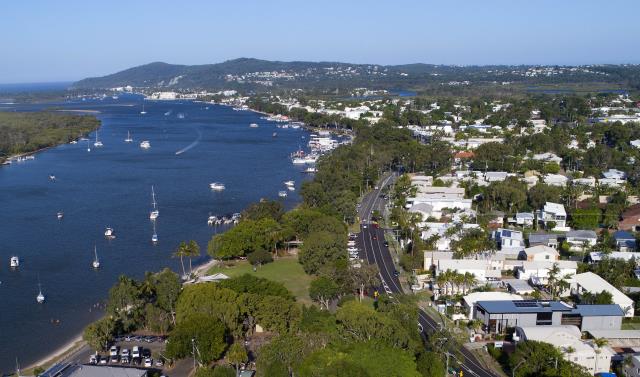An increase in vacant houses, loss of high-end holiday lets, loss of permanent rentals, loss of house sales and the expense of dealing with unwarranted neighbour complaints are just some of the consequences of Noosa Council’s new short-term accommodation laws, according to industry professionals.
Under the new Local Law that came into place in February, all Short Term Accommodation (STA) must have council approval to operate, renewed annually, with exempted properties limited to those on sites identified in the Noosa Plan 2020 as visitor only.
The law requires a local person manage the property, be available 24/7, be located within 20km and respond to complaints within 30 minutes, and that guests abide by a code of conduct to ensure residential amenity. Council has established a 24/7 complaints hotline and register of complaints and is trialling security services contracted to observe activity when required.
Under the new planning scheme the shire is mapped into tourist, high, medium and low density residential zones with STAs considered an “inconsistent use“ of property in low density zones.
Glenn McClellan of Holiday Homes Noosa, which manages 75 properties, said some home owners were still waiting for approvals with a backlog of applications with council.
He said the process had been simple for properties with development and zoning approval but not simple for those applying for approval based on existing use rights who had to prove a history of holiday rental. “Council have created a monopoly. It’s completely unfair,“ he said.
“There’s been confusion with buyers over it,“ real estate agent Dan Neylan said.
“There are people who would pay the prices if they could holiday-let but they have gone elsewhere.
“What’s the purpose of a development approval – it’s to determine the type of building that gets built. Council are using the use to determine how it can be used.
“If I built a holiday complex there’d be no restriction on living there permanently. The reverse doesn’t apply. It’s not right. It’s confusing for buyers. People are losing potential buyers.“
However in certain precincts, for example, in Noosa Waters it was a popular thing with buyers that there was no holiday letting, he said.
In February 2021 Noosa Council estimated there were 4900 dwellings in Noosa being used for STA.
This week a council spokesman said council had received 2534 applications for short-term lets and home-hosted accommodation.
Of those, 1359 had been approved with 37 refused, primarily due to the property not having the lawful town planning rights to operate from the site. Lawful planning rights may be through a development approval, a superseded planning scheme approval as accepted development, or existing use rights, he said.
Mr McClellan said they had lost about five per cent of properties whose owners decided the process was “too hard“.
He said previous prime holiday locations such as Noosa Parade and Witta Circle had taken a noticeable hit with STAs dropping from about 27 to seven and Mr Neylan agreed.
“We’re a premiere holiday destination. What is the five-star accommodation? It’s the houses,“ he said.
“People who have spent $16-20 million on their properties are not holiday-letting, they’re just locking them up. You only need to drive around at night to see it.“
Mr McClellan said they had seen a reduction in the numbers of high-end tourists who were choosing, instead, to go overseas, and weren’t seeing an influx of overseas tourists which existed pre-Covid.
“It’s just another reason for people to not come here,“ he said.
Under the new law, breaches can result in fines, compliance notices and even the suspension or cancellation of STA operating approval.
To ensure they are managing their clients’ houses well and that their guests are doing the right thing, Holiday Homes Noosa has employed security control at an annual cost of $90,000.
Since the law came in Mr McClellan said they had been called, mostly from Council’s hotline, to attend STAs to deal with complaints they discovered to be unreasonable, most relating to three or four of their properties, causing them frustration and abuse from holiday-makers.
“In seven months we haven’t had a legitimate complaint,“ he said.
Among the complaints was one received on a Sunday afternoon about a dog left at the property and fretting.
“We called the guests and they said we’re down the river with our dog,“ he said.
Unable to contact Council they attended the property only to find the distressed dog was at another property down the street.
In another incident, a neighbour complained about a car parked in the street, guests not being allowed to park in the street.
The guests told them it wasn’t their car.
In an attempt to fix the problem they phoned the police who asked if it was legally parked. It was, so it was not a police issue.
“It’s ludicrous, it’s very frustrating,“ he said.
Another time someone complained about a family singing Happy Birthday to their 80-year-old grandfather.
Last Monday, the first day of school holidays, at 9am they received a call about kids swimming in a pool.
“We went there and there were four kids in a swimming pool, just being kids in a pool,“ he said.
Mr McClellan said all their guests were made aware of the local law and provided with a Code of Conduct before booking.
In this instance he told the tenants the kids had to be quiet. If they weren’t quiet they’d have to get out of the pool or leave the premises, he told them.
A council spokesman said they had received 184 complaints received in total, with 117 of these made through council’s 24/7 hotline.
“The complaints have largely been about the short-stay letting property impacting residential amenity due to noise coming from the property, including use of outdoor areas late at night. Complaints … have also been made about car parking and bins left out,“ he said.
Council has issued a number of formal notices to the owners of short-stay letting properties for failing to comply with their local law approval. At this stage, no infringements have been issued as the operators have addressed the identified breaches, council told Noosa Today.
During council’s local law consultation process ,blame for a shortage of affordable, permanent accommodation was levelled at properties being used instead for STAs but the experts say the implementation of the law has seen a greater loss of affordable accommodation.
“There’s zero evidence of STAs used for permanent use. If they can’t use it themselves, (owners) lock it up,“ Mr Neylan said.
In older areas in Noosa Hill and Noosaville, now zoned for STA, there were a lot of affordable units.
“It’s driving permanent tenants out of affordable units, cheap units in medium zones, for holiday letting, he said.
“Some of the older holiday units are no longer being used for holiday lets so that’s reduced places available for affordable family holidays. They’re being sold for permanent residents, but not at affordable prices.
“When you look at the stock of holiday homes, they’re not affordable accommodation,“ Mr McClellan said.
On a positive note, people were still coming to Noosa to holiday with their accommodation “relatively full“, he said.
But the lack of affordable accommodation was having a widespread impact on staff availability and leading to an increase in people visiting Noosa for the day and seeking accommodation outside the shire, using infrastructure and increasing traffic congestion.
“From a labour issue, they can’t afford to live here,“ Mr Neylan said.
“Everyone’s down on landlords but stats show there are 600,000 rentals across Queensland and only 15 per cent provided by the government. The rest are by mum and dad.
“What’s going to encourage them?
“It’s not attractive to rent. Tenants are getting more rights. We have a land tax the State Government is bringing in.
“I think we desperately need to solve this issue.“









